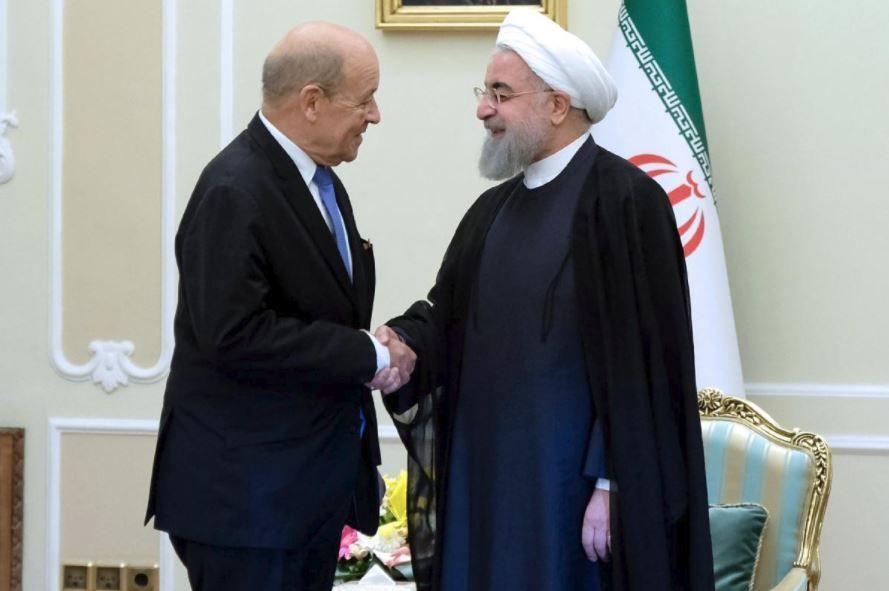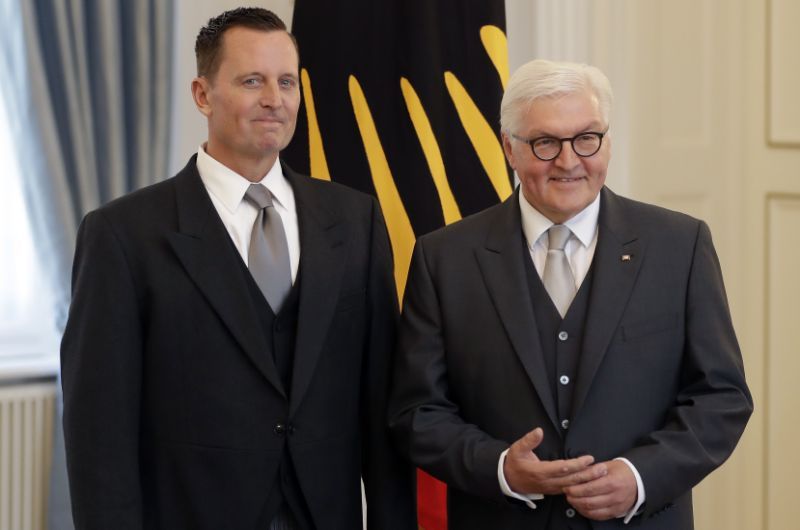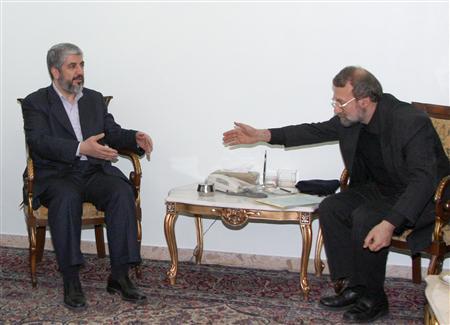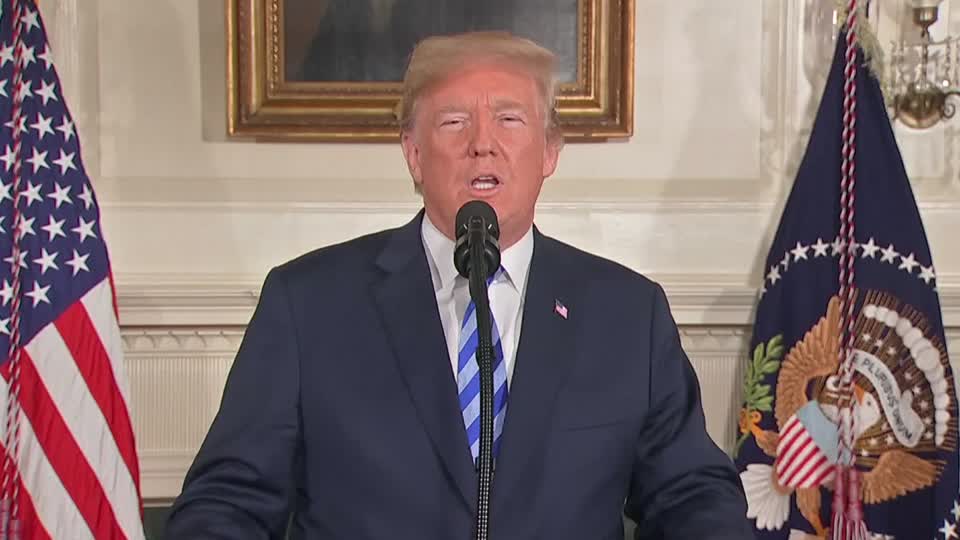By Yara Bayoumy and Michael Georgy
WASHINGTON/BEIRUT, May 9 (Reuters) – Dismayed European allies sought to salvage the international nuclear pact with Iran on Wednesday after President Donald Trump pulled the United States out of the landmark accord, while officials in Tehran poured scorn on the U.S. leader.

“The deal is not dead. There’s an American withdrawal from the deal but the deal is still there,” French Foreign Minister Jean-Yves Le Drian said.
French President Emmanuel Macron would speak later in the day to his Iranian counterpart Hassan Rouhani, Le Drian said. Iran also signalled its willingness to talk.
Trump announced on Tuesday he would reimpose U.S. economic sanctions on Iran to undermine what he called “a horrible one-sided deal that should have never, ever been made”.
The 2015 agreement, worked out by the United States, five other world powers and Iran, lifted sanctions on Iran in exchange for Tehran limiting its nuclear program. The pact was designed to prevent Iran from obtaining a nuclear bomb.
Trump complained that the deal, the signature foreign policy achievement of his Democratic predecessor, Barack Obama, did not address Iran’s ballistic missile program, its nuclear activities beyond 2025 or its role in conflicts in Yemen and Syria.
His decision raises the risk of deepening conflicts in the Middle East, puts the United States at odds with European diplomatic and business interests, and casts uncertainty over global oil supplies. Oil prices rose more than 2 percent on Wednesday, with Brent hitting a 3-1/2-year high.
It could also strengthen the hand of hardliners at the expense of reformers in Iran’s political scene.
France’s Le Drian said Iran was honouring its commitments under the accord.
“The region deserves better than further destabilisation provoked by American withdrawal. So we want to adhere to it and see to it that Iran does too, that Iran behaves with restraint,” he told French radio station RTL.
The European Union said it would remain committed to the deal and would ensure sanctions on Iran remain lifted, as long as Tehran meets its commitments.
France and others were well aware that there were concerns about issues other than nuclear capability but they too could be addressed without ditching the nuclear deal, Le Drian said.
Macron’s contact with Rouhani will be followed by meetings next week, probably on Monday, involving the Iranians and European counterparts from France, Britain and Germany.
The prospects of saving the deal depend in large measure on whether international companies are willing and able to still do business with Iran due to the U.S. sanctions.
Le Drian said meetings would also be held with firms including oil giant Total and others with major business and economic stakes in the region.

In a harbinger of what could be in store, Trump’s new ambassador to Germany saidGerman businesses should halt their activities in Iran immediately.
French Finance Minister Bruno Le Maire said Trump’s decision was a mistake and that the United States should not consider itself the world’s “economic policeman”.
European companies including carmaker PSA, plane manufacturer Airbus and Siemens said they were keeping a close watch on the situation.
MENTAL CAPACITY
In Tehran, the speaker of the Iranian parliament mocked Trump, saying he was not fit for his job.
“Trump does not have the mental capacity to deal with issues,” speaker Ali Larijani told the assembly. Larijani comes from one of the most prominent political families in Iran and often acts as a diplomatic envoy.

Members of parliament burned a U.S. flag and a symbolic copy of the Iran deal, known officially as the Joint Comprehensive Plan of Action (JCPOA), as a session of parliament began. They also chanted “Death to America”.
General Mohammad Baqeri, the chief of staff of Iran’s military, said Iran had not had to sign the deal.
“But that arrogant country (America) did not even stand by its signature,” the Islamic Republic News Agency (IRNA) quoted him as saying.
President Hassan Rouhani, a reformist, struck a more pragmatic tone, saying immediately after Trump’s announcement that Iran would remain committed to the deal without Washington.
“If we achieve the deal’s goals in cooperation with other members of the deal, it will remain in place,” he said in a televised speech.
“I have ordered the foreign ministry to negotiate with the European countries, China and Russia in coming weeks. If at the end of this short period we conclude that we can fully benefit from the JCPOA with the cooperation of all countries, the deal would remain,” he said.
Trump’s decision intensifies the strain on the trans-Atlantic alliance since he took office 16 months ago. One by one, European leaders came to Washington and tried to meet his demands, while pleading with him to preserve the deal.
The Trump administration kept the door open to negotiating another deal with allies, but it is far from clear whether the Europeans would pursue that option or be able to convince Iran to accept it.
The leaders of Britain, Germany and France, signatories to the deal along with China and Russia, said in a joint statement that Trump’s decision was a cause for “regret and concern.”
China said it regretted the move. Its foreign ministry said Beijing would safeguard the deal and called on all relevant parties “to assume a responsible attitude”.
A Western diplomat was more pointed.
“It announces sanctions for which the first victims will be Trump’s European allies,” the diplomat said, adding that it was clear Trump did not care about the alliance.
AMERICA FIRST
Abandoning the Iran pact was one of the most consequential decisions of Trump’s high-stakes “America First” policy, which has led him to withdraw the United States from the Paris climate accord, come close to a trade war with China and pull out of an Asian-Pacific trade deal.
It also appeared to reflect the growing influence within the administration of Iran hawks like new Secretary of State Mike Pompeo and national security adviser John Bolton.

Iran denies it has tried to build atomic weapons and says its nuclear program is for peaceful purposes. U.N. inspectors say Iran has not broken the nuclear deal and senior U.S. officials themselves have said several times that Iran is in technical compliance with the pact.
Renewing sanctions would make it much harder for Iran to sell its oil abroad or use the international banking system.
Iran is the third-largest member of the Organization of the Petroleum Exporting Countries and pumps about 3.8 million barrels per day of crude, or just under 4 percent of global supply. China, India, Japan and South Korea buy most of its 2.5 million bpd of exports.
According to the U.S. Treasury, sanctions related to Iran‘s energy, auto and financial sectors will be reimposed in three and six months.
Licenses for Boeing Co and Airbus to sell passenger jets to Iran will be revoked, U.S. Treasury Secretary Steve Mnuchin said, scuttling a $38 billion deal.
Trump said the nuclear agreement did not prevent Iran from cheating and continuing to pursue nuclear weapons.
“It is clear to me that we cannot prevent an Iranian nuclear bomb under the decaying and rotten structure of the current agreement,” he said. “The Iran deal is defective at its core.”
Trump said he was willing to negotiate a new deal with Iran, but Tehran already has ruled that out and threatened unspecified retaliation if Washington pulled out.
Iran’s growing military and political power in Yemen, Syria, Lebanon and Iraq worries the United States, Israel and U.S. Arab allies such as Saudi Arabia.
Among the few nations to welcome Trump’s decision to renege on the deal were Israel and Saudi Arabia, Iran’s arch-foes in the Middle East.
(Reporting by Steve Holland; Additional reporting by Tim Ahmann, Makini Brice, Warren Strobel, Jonathan Landay and Arshad Mohammed, Patricia Zengerle, David Lawder, Mohammad Zargham in Washington, Ayenat Mersie in New York, Sybille de La Hamaide, John Irish and Tim Hepher in Paris, Parisa Hafezi in Ankara, David Milliken and Bozorgmehr Sharafedin in London and Andrew Torchia in Dubai Writing by Angus MacSwan, Editing by Nick Tattersall)

